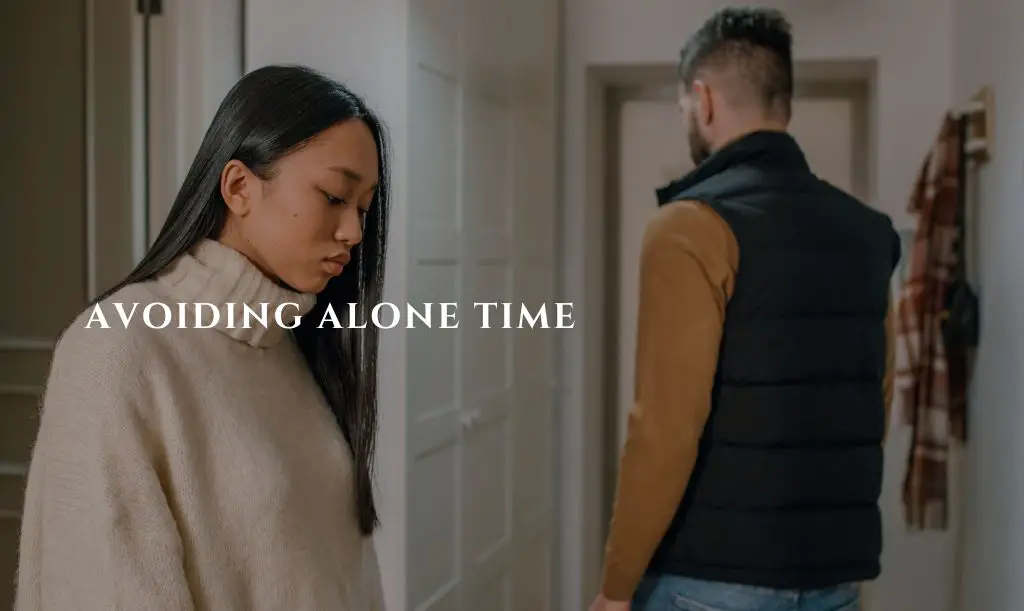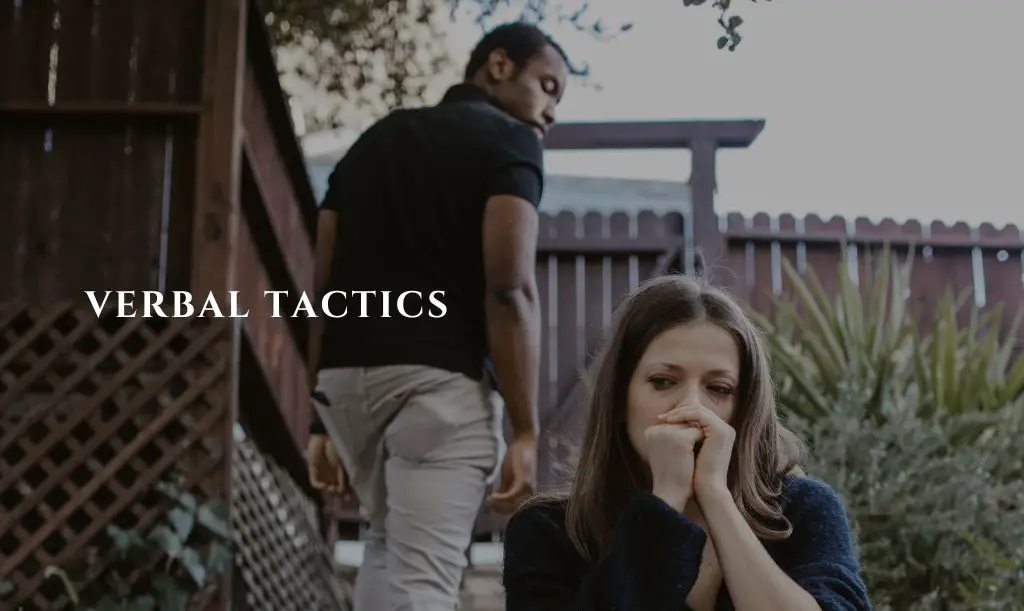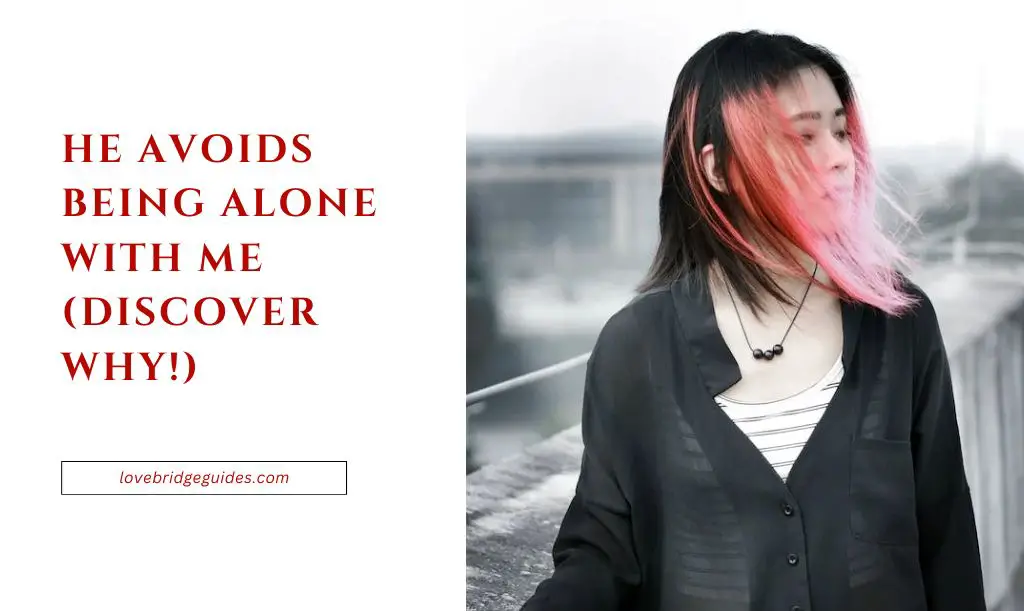‘He avoids being alone with me! What does this mean?’
Human interaction, with all its intricacies and nuances, has long been a subject of fascination.
It is a captivating ballet that unfolds in countless ways, often leaving us bewildered and craving deeper understanding.
One puzzling aspect that frequently emerges is the phenomenon of avoiding alone time.
When someone actively dodges one-on-one encounters, it creates a perplexing dynamic teeming with unspoken emotions.
The avoidance of solitude can send mixed signals and leave us questioning our own worthiness or desirability.
It’s essential to delve into this topic and unravel its complexities to navigate these perplexing waters.
Avoiding Alone Time

Avoiding alone time is like trying to catch smoke with bare hands – elusive and intangible.
It is an enigma that leaves us floundering for answers, trying desperately to grasp why someone would go to such lengths to avoid being alone with us.
The emotions stirred by this behavior range from confusion to frustration, shaking our confidence and igniting insecurities within ourselves.
To truly understand this intricate puzzle, we need to explore the psychology behind avoidance, decode nonverbal communication, analyze verbal tactics employed for evasion, delve into personal histories that shape this behavior, and even consider the influence of cultural norms on personal boundaries.
He Avoids Being Alone With Me: An Intriguing Phenomenon
SAvoiding alone time with someone is like opening a Pandora’s box filled with unanswered questions and lingering doubts.
It’s as though we are standing at the edge of an abyss, uncertain whether to lean in or retreat.
The enigmatic nature of this phenomenon intensifies its impact on our psyche.
We find ourselves pondering over various possibilities – was it something we said or did?
Is it a reflection on our worthiness as companions?
As we delve deeper into these swirling thoughts, it becomes clear that avoiding alone time is not merely about physical proximity but carries implications for emotional intimacy.
When someone intentionally steers clear from one-on-one encounters, it raises disconcerting questions about vulnerability and emotional connections.
We yearn for deep connections that transcend superficial conversations; hence any act that hampers such possibilities can be disheartening.
Additionally, avoidance also challenges our sense of self-worth as we question why we are not deserving enough to share intimate moments with another individual.
This enigma, then, becomes a catalyst for introspection and self-discovery.
The Psychology Behind Avoidance

When it comes to understanding why someone avoids being alone with you, it is essential to delve into the depths of human psychology.
One prominent factor that contributes to avoidance is the fear of vulnerability and emotional intimacy.
Many individuals find solace in maintaining a façade of emotional detachment, shielding themselves from the potential pain and hardship that accompanies opening up to another person.
This fear stems from the innate need for self-preservation, as exposing our innermost thoughts and feelings can leave us vulnerable to rejection and heartbreak.
Past Experiences Shaping Present Behavior:
Another crucial aspect influencing avoidance is one’s past experiences.
Our interactions with others shape our present behavior, often leaving lasting impressions on how we approach relationships.
For instance, if an individual has previously faced betrayal or heartbreak in a similar situation, they may develop defense mechanisms such as avoiding intimate encounters altogether.
These past encounters imprint upon their psyche, making them reluctant to put themselves in potentially vulnerable situations again.
Personal Boundaries And Comfort Zones:
Everyone possesses personal boundaries and comfort zones that govern their interactions with others.
While some people are naturally more extroverted and open to sharing space with others freely, many individuals have distinct limits on their preferred level of closeness or alone time with certain individuals.
These personal boundaries can be influenced by several factors such as cultural upbringing, personality traits, or even individual preferences developed over time.
Respecting these boundaries is crucial for fostering healthy relationships built on trust and mutual understanding.
Decoding Nonverbal Communication

Body language is a universal language that speaks volumes without the need for words.
It is through our physicality that hidden emotions and intentions are revealed.
When someone avoids being alone with you, they will unconsciously display various nonverbal cues that betray their discomfort or unwillingness to engage in intimate settings.
Maintaining Distance through Crossed Arms or Legs
Picture this: you’re engaged in a conversation, eagerly hoping for a deeper connection, only to witness your companion folding their arms tightly across their chest or crossing their legs as if building an impenetrable fortress.
These subtle yet powerful actions scream one thing: keep your distance!
Their body becomes a fortress of walls, shutting you out emotionally and physically.
It’s as if they are creating an invisible barrier between you, preventing any possibility of vulnerability.
Quick Glances towards Exits or Distractions
Watch closely when someone avoids being alone with you; observe where their eyes dart.
Do they linger on the exit sign or subtly scan the room for any potential distractions?
These fleeting moments of gaze speak volumes about their discomfort with the idea of being alone with you.
They long for an escape route, something to divert their attention from facing the intimacy that solitude may bring forth.
Fidgeting or Restlessness as a Form of Discomfort
Restlessness is like an internal earthquake shaking within oneself—unstable ground beneath our feet—when confronted with the prospect of being alone with another person.
Observe how your companion fidgets nervously in their seat or taps their foot relentlessly against the floor.
These unconscious movements betray the anxiety bubbling inside them—their body pleading for relief from impending discomfort.
The art of body language, with its crossed arms, quick glances towards exits or distractions, and restless fidgeting, reveals the truth behind someone’s avoidance of being alone with you.
It is through these subtle signs and gestures that we must decipher the unspoken messages and understand their reluctance to enter into intimate encounters.
Verbal Tactics Employed to Dodge Alone Time

When faced with the uncomfortable prospect of spending one-on-one time, some individuals possess a remarkable talent for steering conversations away from personal matters.
They gracefully transition from potentially revealing topics to safe and unassuming ones.
It’s as if they have a secret manual titled “101 Ways to Dodge Emotional Intimacy.”
They skillfully navigate through the treacherous sea of vulnerability, ensuring that their emotional fortress remains intact.
One moment you’re on the verge of discussing your deepest fears and aspirations, and the next moment you find yourself entangled in a discourse about weather patterns or the latest celebrity gossip.
It’s truly an impressive display of conversational escapism.
Scheduling Conflicts as a Convenient Excuse
“Oh, I’m so sorry, but I seem to be booked solid for the next few weeks!”
Sound familiar?
This classic maneuver is often employed by those who wish to avoid intimate encounters masquerading under the guise of busyness.
Whether it’s an overflowing calendar or fictitious engagements that pop up out of thin air, these individuals have mastered the art of scheduling conflicts.
It almost makes you wonder if they moonlight as professional event planners!
The truth is, their elaborate web of excuses serves as a protective shield against forging deeper connections with others.
While they may genuinely lead busy lives at times, it becomes evident that their avoidance techniques are more about safeguarding their emotional walls than meeting real obligations.
Engaging in Group Activities to Dilute One-on-One Encounters
Group activities can be wonderful opportunities for bonding and creating lasting memories with friends and loved ones.
However, when someone consistently gravitates towards group settings instead of embracing intimate one-on-one interactions, it raises a few eyebrows.
This individual seems to have an uncanny knack for orchestrating outings that involve a crowd, ensuring that the focus remains dispersed and shared among many.
It’s almost as if they fear being caught in the vulnerable spotlight of personal connection.
They thrive on the safety net that comes with group dynamics, using it as an excuse to avoid delving into deeper conversations or facing their own emotional demons.
When faced with the prospect of alone time, some individuals resort to verbal tactics that allow them to dodge vulnerability like seasoned escapologists.
Through skillful deflection techniques such as diverting conversations to neutral topics, utilizing scheduling conflicts as convenient excuses, and engaging in group activities to dilute one-on-one encounters, they successfully erect emotional barriers meant to keep others at arm’s length.
It is essential for both parties involved to recognize these avoidance mechanisms and address them with compassion and understanding.
Only through open communication and a willingness to confront our fears can we hope to break down these walls and forge meaningful connections based on trust and vulnerability.
Unearthing Root Causes

Our early years lay the foundation for how we approach relationships in adulthood.
The attachment styles developed during childhood significantly influence our relationship dynamics.
These attachment styles are deeply ingrained within us and play a vital role in understanding why some individuals avoid being alone with others.
Anxious attachment style and fear of abandonment:
Those with an anxious attachment style are often plagued by an incessant fear of abandonment.
Stemming from inconsistent or unreliable caregivers during their formative years, they carry deep-seated insecurities into their adult relationships.
This fear becomes the driving force behind avoiding one-on-one interactions, as they perceive vulnerability as a potential trigger for rejection and abandonment.
Avoidant Attachment Style And Self-Reliance Tendencies:
Contrarily, individuals with an avoidant attachment style tend to exhibit self-reliance tendencies and a preference for independence.
This inclination towards self-sufficiency is rooted in childhood experiences where caregivers were emotionally distant or neglectful.
Consequently, they learn to rely solely on themselves, shying away from intimate connections that may expose them to dependency or emotional entanglement.
Disorganized Attachment Style And Unpredictable Behavior:
For those with a disorganized attachment style, characterized by erratic emotions and unpredictable behaviors, being alone with someone can evoke anxiety and discomfort.
This attachment style often arises from traumatic experiences during childhood such as abuse or neglect.
The resulting emotional turmoil leaves individuals uncertain about forming close bonds and generates a persistent sense of unease when faced with intimate settings.
Emotional Scars From Past Relationships:
Past wounds inflicted by betrayal, heartbreak, or trauma can have lingering effects on our willingness to engage in one-on-one interactions.
Emotional scars acquired through failed relationships can create an aversion to alone time, as it serves as a reminder of the vulnerability and pain experienced in the past.
These scars act as defense mechanisms, urging individuals to protect themselves from potential harm by avoiding close proximity with others.
The complexities behind avoiding alone time with someone often lie deep within our personal histories.
Attachment styles developed during childhood and emotional scars from past relationships significantly impact our behavior and approach towards intimacy.
Understanding these root causes can help shed light on why some individuals exhibit avoidance mechanisms when it comes to one-on-one interactions.
It is essential to approach these situations with empathy and patience, allowing individuals the space they need to navigate their fears and heal from their past experiences.
He Avoids Being Alone With Me: Conclusion
‘He avoids being alone with me’
Navigating the labyrinth of human interactions has always been a perplexing endeavor.
The art of avoiding alone time is an enigmatic phenomenon that has roots in various psychological factors, nonverbal communication cues, personal history, and cultural influences.
While it may be tempting to view avoidance behavior solely as a negative trait or an indication of disinterest, it is crucial to approach this topic with empathy and understanding.
Each individual’s journey is unique; their past experiences shape their present behaviors in ways we may never fully comprehend.
By fostering open-mindedness and engaging in compassionate dialogue with one another, we can strive for deeper connections built on mutual respect and understanding.
After all, it is within these genuine connections that we find solace amid the complexities of human nature
Related Articles:
- https://lovebridgeguides.com/she-loves-me-but-shows-no-affection/
- https://lovebridgeguides.com/5-dates-and-he-hasnt-made-a-move/
- Does A Prom Date Mean Anything? (Answered!) - 20 February 2024
- Boyfriend Refers To Me In Third Person (Explained!) - 20 February 2024
- Is Sending Memes Flirting? Find Out Here! - 20 February 2024

